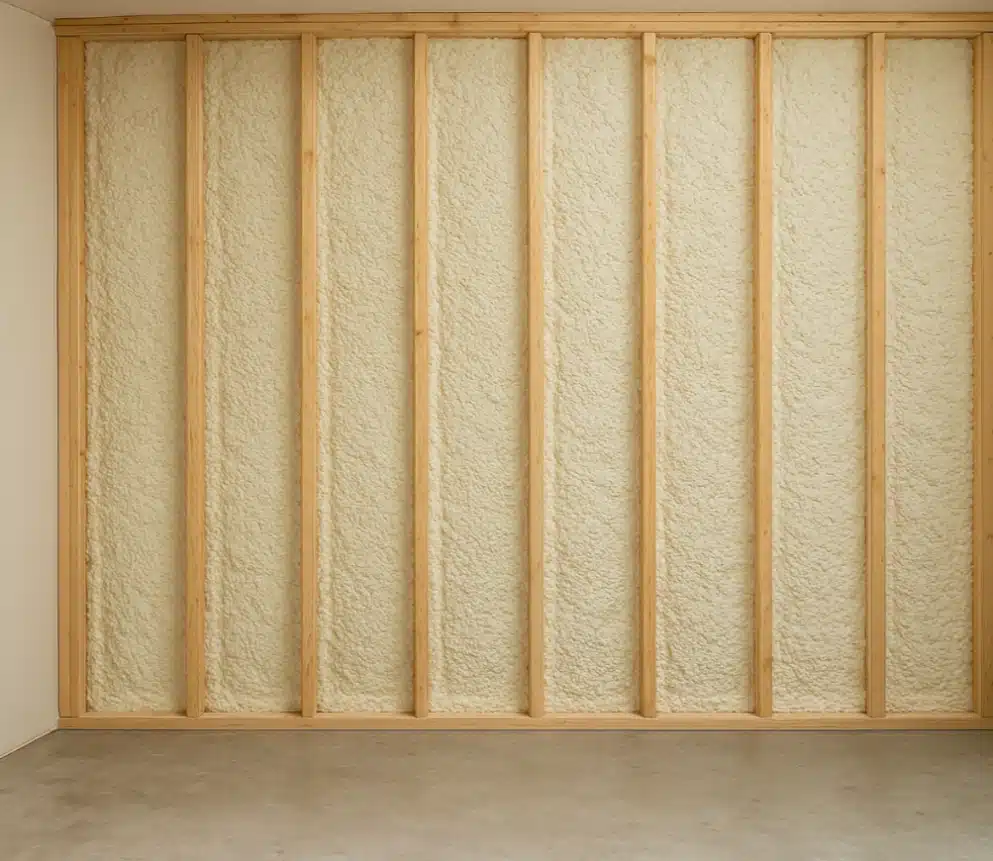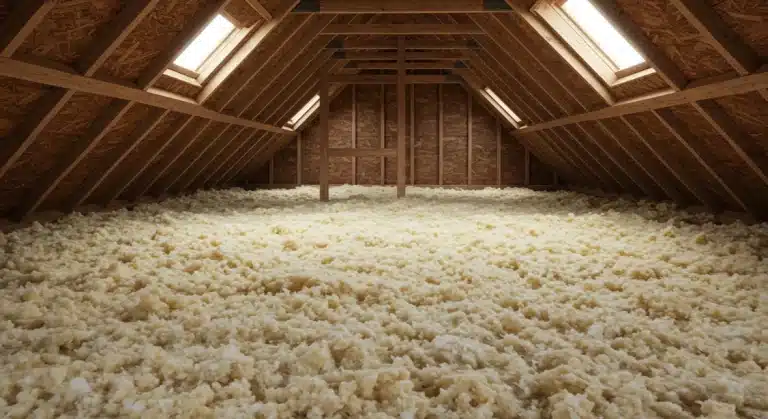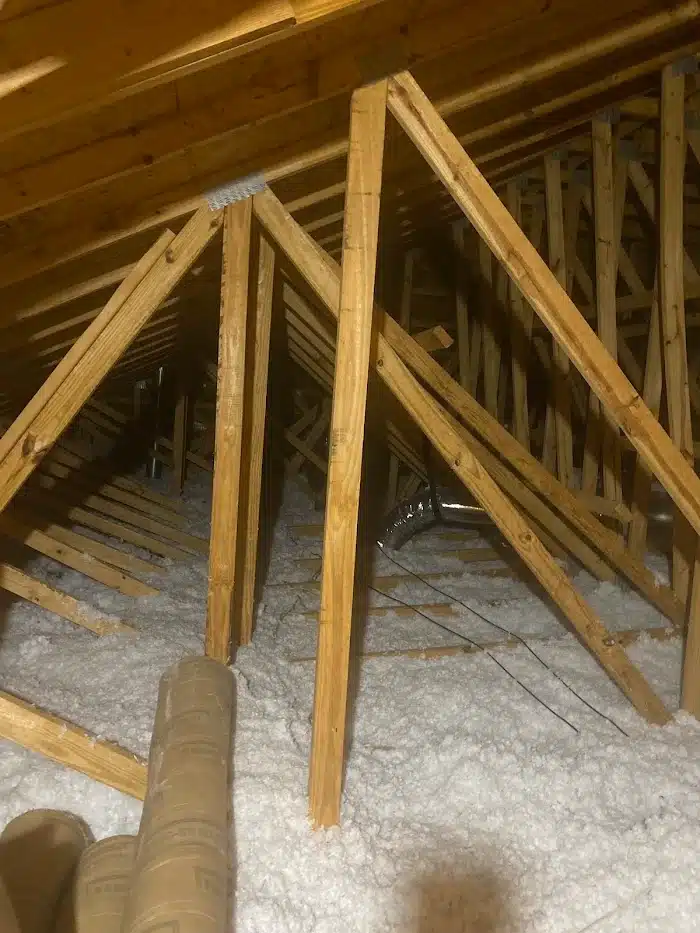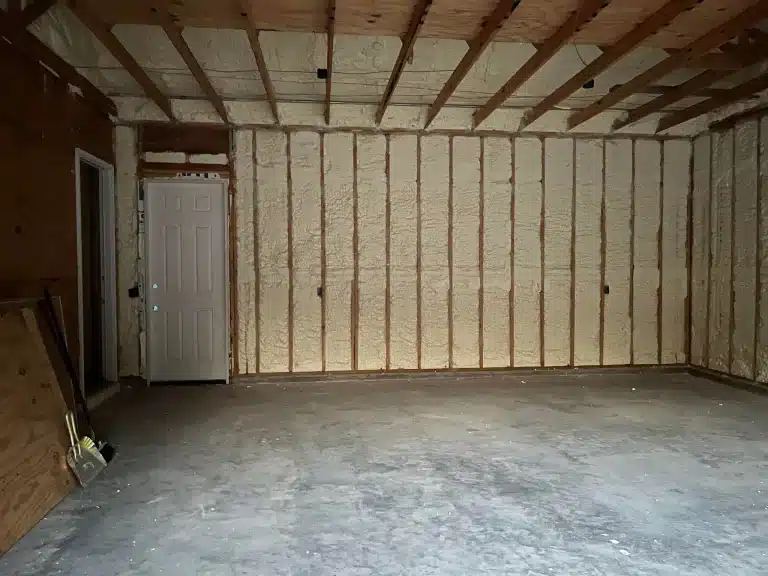Closed-cell spray foam insulation offers superior vapor barrier protection compared to open-cell spray foam. The denser structure of closed-cell foam acts as both an air barrier and a moisture barrier, significantly reducing the risk of condensation-related issues. In contrast, open-cell spray foam allows water vapor to pass through more easily due to its porous structure.
For residential and commercial applications where vapor control is critical such as roofing systems, crawl spaces, and humid environments closed-cell spray foam provides more reliable performance. This article breaks down the structural and performance differences in detail.
Prestige Insulation Solutions draws on direct field experience in various climates and building types to present this comparison with a focus on practical outcomes.
Core Comparison Table
| Property | Closed-Cell Spray Foam | Open-Cell Spray Foam |
|---|---|---|
| Vapor Permeability | < 1 perm (Class II vapor retarder) | > 10 perms (Not a vapor retarder) |
| Water Absorption | Low (closed structure) | High (absorbs water) |
| R-Value per Inch | R-6.0 to R-7.0 | R-3.5 to R-4.0 |
| Density | ~2.0 lb/ft³ | ~0.5 lb/ft³ |
| Air Barrier | Yes | Yes |
| Structural Reinforcement | Adds rigidity to surfaces | No structural contribution |
| Cost | Higher | Lower |
| Best Use Cases | Roofs, basements, crawl spaces | Interior walls, sound dampening |
Technical Specifications
| Specification | Closed-Cell Foam | Open-Cell Foam |
|---|---|---|
| ASTM E96 (Vapor Permeance) | < 1 perm | 10-16 perms |
| ASTM C518 (Thermal Resistance) | R-6.5/inch typical | R-3.8/inch typical |
| Water Absorption (ASTM D2842) | < 2% | Up to 25% |
| Air Leakage (ASTM E283) | < 0.02 L/s/m² | < 0.02 L/s/m² |
Performance in Humid and Coastal Climates
Closed-cell spray foam remains dimensionally stable and moisture-resistant even in the Gulf Coast region where humidity levels routinely exceed 80%. This prevents mold formation and material degradation. Open-cell foam, by contrast, can absorb moisture in high-humidity environments, making it unsuitable as a vapor barrier.
According to a 2023 report by Building Science Corporation, closed-cell foam reduces vapor transmission by over 90% compared to open-cell foam in coastal structures. This aligns with field results observed by Prestige Insulation Solutions during roof retrofits in Pensacola, FL.
Bonus Tip: For slab-on-grade foundations or crawl spaces in the Southeast, applying closed-cell spray foam to rim joists and subflooring prevents capillary moisture intrusion from the soil.
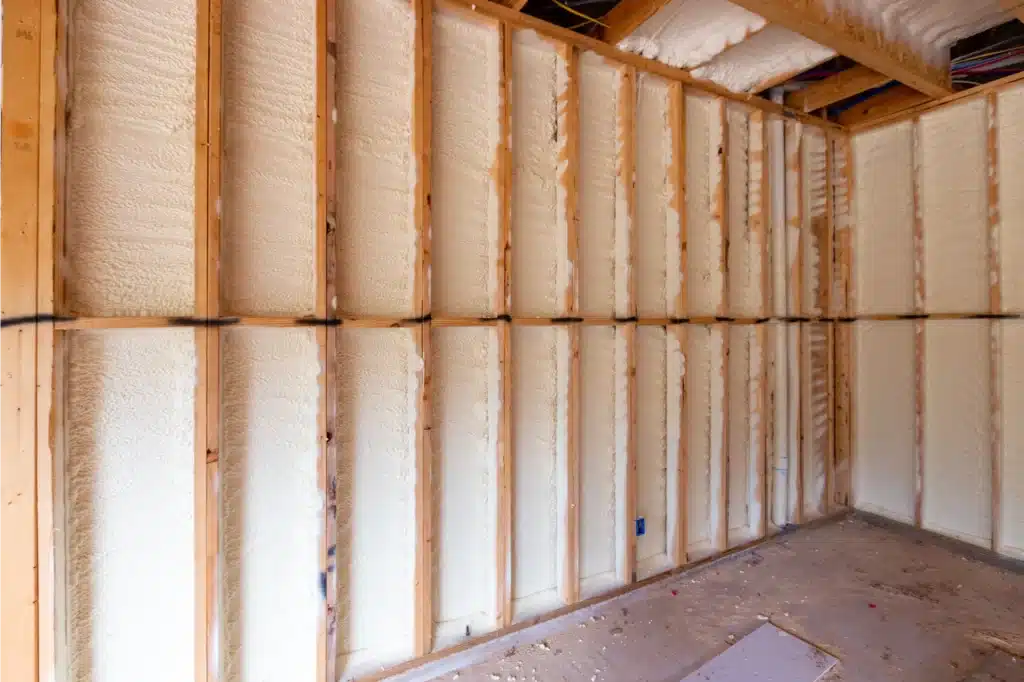
Things to Consider Before Making a Decision
- Climate Conditions: In high-humidity or coastal areas, closed-cell foam is more effective.
- Budget: Open-cell foam is more affordable but lacks vapor barrier function.
- Wall Assembly Requirements: Check if your project requires a Class II vapor retarder.
- Existing Moisture Problems: Closed-cell is better suited for areas with prior moisture damage.
- Building Codes: Always verify compliance with local vapor barrier requirements.
Bonus Tip: In mixed climates, a hybrid system using both open- and closed-cell spray foam can balance cost with performance use closed-cell in high-risk zones and open-cell in interior walls.
Common Questions Before Choosing
Which spray foam should I use for a metal roof?
Closed-cell foam is recommended because it adds rigidity, resists condensation, and performs well under temperature swings.
Does open-cell spray foam control humidity?
It blocks air movement but not vapor. Additional vapor control layers are needed.
Is thicker open-cell foam a solution?
No. Thickness doesn’t compensate for its vapor permeability. It can still allow moisture diffusion.
Can spray foam be applied to damp surfaces?
Neither type should be applied to wet substrates. Surface moisture must be eliminated first.
Get Expert Insulation Guidance
Need clarity on which insulation type fits your project?
Contact Prestige Insulation Solutions at (850) 429-4969 or email [email protected] to schedule a consultation.
Receive expert advice rooted in real-world installation experience across diverse climates and structural conditions.
Related Services from Prestige Insulation Solutions
- Spray Foam Insulation: Closed-cell and open-cell foam installation for residential and commercial use.
- Roof Insulation Application of vapor-resistant closed-cell spray foam for attic and roof systems.
- Insulation Removal Safe removal of failed or moisture-compromised insulation before reapplication.
- Commercial Insulation High-performance solutions for buildings requiring moisture control and energy efficiency.
FAQ Section
What happens if I use open-cell spray foam in a roof deck?
Open-cell foam can trap moisture if there’s no secondary vapor barrier, leading to mold and structural decay.
How do I check if I need a vapor barrier?
Evaluate regional climate, wall assembly composition, and code requirements. Consult with a qualified contractor.
Does closed-cell spray foam need an additional vapor barrier?
Usually not. Its permeability rating qualifies it as a vapor retarder in most assemblies.
What type of maintenance is needed post-installation?
Closed-cell foam requires little maintenance. Periodic inspections are recommended, especially in roofing systems.
Can I mix open-cell and closed-cell spray foam in one project?
Yes. Strategic use of both can optimize cost and performance when applied correctly.


